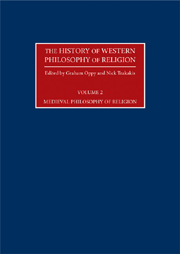Book contents
- Frontmatter
- Contents
- Editorial Introduction
- Contributors
- 1 Medieval Philosophy of Religion: An Introduction
- 2 Boethius
- 3 Johannes Scottus Eriugena
- 4 Al-Farabi
- 5 Avicenna (Ibn Sina)
- 6 Anselm of Canterbury
- 7 Al-Ghazali
- 8 Peter Abelard
- 9 Bernard of Clairvaux
- 10 Averroes (Ibn Rushd)
- 11 Moses Maimonides
- 12 Roger Bacon
- 13 Thomas Aquinas
- 14 John Duns Scotus
- 15 William Ockham
- 16 Gersonides
- 17 John Wyclif
- 18 Nicholas of Cusa
- 19 Erasmus of Rotterdam
- Chronology
- Bibliography
- Index
4 - Al-Farabi
- Frontmatter
- Contents
- Editorial Introduction
- Contributors
- 1 Medieval Philosophy of Religion: An Introduction
- 2 Boethius
- 3 Johannes Scottus Eriugena
- 4 Al-Farabi
- 5 Avicenna (Ibn Sina)
- 6 Anselm of Canterbury
- 7 Al-Ghazali
- 8 Peter Abelard
- 9 Bernard of Clairvaux
- 10 Averroes (Ibn Rushd)
- 11 Moses Maimonides
- 12 Roger Bacon
- 13 Thomas Aquinas
- 14 John Duns Scotus
- 15 William Ockham
- 16 Gersonides
- 17 John Wyclif
- 18 Nicholas of Cusa
- 19 Erasmus of Rotterdam
- Chronology
- Bibliography
- Index
Summary
Known as the ‘Second Teacher’ in the Arabic tradition – second to none other than Aristotle who is recognized as the ‘First Teacher’ – Abū Naṣr Muḥammad ibn Muḥammad al-Fārābī (al-Farabi) (c.870–c.950) has received a resounding tribute from a leading contemporary scholar: this philosopher of the Islamic milieu “stands at the head of all subsequent philosophers who made Greek philosophy Western philosophy” (Gutas 1999b: 222). This means that al-Farabi is a personage of global proportions and ought to be repositioned in the context of world civilization, so that he is no longer seen as irrelevant to what we now consider philosophy. Indeed, his works on (Greek) logic and its relationship to the grammar and usages of ordinary language, his political thought, his conceptual enrichment and expansion of Aristotle's notion of God along Neoplatonic lines and above all his overarching theory of intellect, or noetics, with its epistemological and ontological implications, something we find centuries later in Descartes all constitute a milestone in the history of philosophy.
OBSCURE PERSONAL HISTORY
About al-Farabi's personal life we know very little. One does not find any detailed biography until some two hundred years after his death. In fact, a major role in bringing him into focus at a later date is played by the ‘Grand Shaykh’ Avicenna (Ibn Sina, d. 1037), whose works had generated a feverish interest during the heyday of philosophical activity in Islam in the twelfth and thirteenth centuries. Avicenna had presented himself as al-Farabi's follower and successor.
- Type
- Chapter
- Information
- The History of Western Philosophy of Religion , pp. 47 - 60Publisher: Acumen PublishingPrint publication year: 2009

